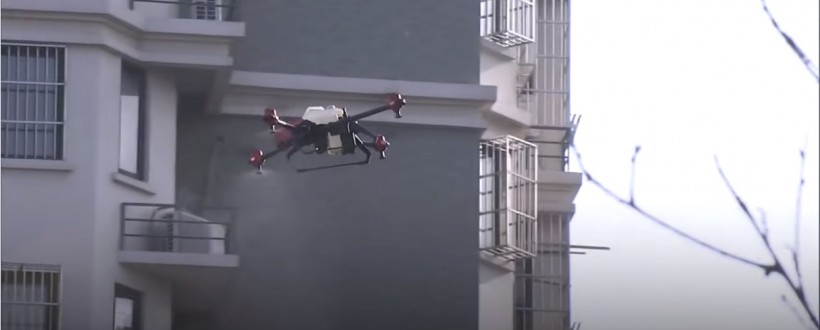
A drone dispersed clouds of disinfectant in the sky above Indonesia’s second-largest city Surabaya on Tuesday, a response to the coronavirus outbreak which is spreading fast around the world even though having warnings from health experts.
A drone dispersed clouds of disinfectant in the sky above Indonesia's second-largest city Surabaya on Tuesday, a response to the coronavirus outbreak which is spreading fast around the world in spite of the countless warnings from health experts.
From Turkey's Grand Bazaar to bridges in Mexico and migrant workers in India, mass disinfections were regularly held by laborers in protective gear resembling characters from the comedy movie Ghostbusters.
Drone disinfection: Is it effective?
Impressive measures taken to contain the quick-spreading virus which has killed more than 37,000 people globally have been criticized by disease specialists as a health hazard as well as a waste of time and assets.
Dale Fisher, an infectious diseases expert in Singapore who chairs the Global Outbreak Alert and Response Network coordinated by the World Health Organization said, "It's a ridiculous image seen in many countries."
"I don't believe it adds anything to the response and could be toxic on people. The virus does not survive for long in the environment and people do not generally touch the ground," he also added.
Using drones for disinfection was necessary in areas with confirmed cases of the coronavirus because the virus can be anywhere, said by the spokesman for Surabaya's mayor.
Febriadhitya Prajatara also talked about the benzalkonium chloride disinfectant, which can cause skin irritations in high concentrations. Although this would help debilitate the virus so it won't enter our body, it can be toxic.
Coronavirus is an infectious respiratory illness that spreads through droplets from the nose or mouth by means of sneezing or coughing. Individuals can likewise get infected by contacting something contaminated before touching their own nose, mouth or eyes. To prevent this, WHO advises washing hands regularly.
Experts advised against mass disinfections
Paul Tambyah, the Asia Pacific Society of Clinical Microbiology and Infection said that handwashing and cleaning of frequently touched surfaces like elevator buttons and escalator and mall door handle offered better protection than mass disinfecting.
Tambyah said, "Spraying is probably a cheap and visible way of doing it, but careful attention to personal and environmental hygiene is probably more effective."
Indian health workers in the northern state of Utter Pradesh used hosepipes to douse migrant workers, fearing that the movement of people from cities to the countryside risks spreading the virus.
In Malaysia, authorities have gone on a disinfection spree under nationwide lockdown due to the virus in areas with high case numbers to reduce the risk of further contamination.
Images of plumes of disinfectant spray discharged from trucks into the air or from spray guns on to roads have riled health experts.
Read also: North Korea Reports Zero Coronavirus Cases, Sparks Talks of Secret Epidemic
Christopher Lee, former deputy director-general in Malaysia's health ministry and an infectious disease specialist said, "Disinfecting roads is clearly not going to be impactful, waste of resources and man-hours."
Noor Hisham Abdullah, Malaysia's director-general of health said on Tuesday that the government would issue guidelines to the local authorities to make sure disinfection operations are carried out accordingly.
How mass disinfection makes people feel 'safe'
In Indonesia, box-shaped disinfection chambers are being set up over the capital of Jakarta, offering passers-by a quick blast to rid their clothes and skin of potential germs.
After exiting one of the chambers outside a bus stop in central Jakarta, Fany Anisa, a resident from Jakarta said "I think it's good...I feel sanitized after touching a lot of things from the bus...I feel well-protected.".
The private activity being turned out with the help of local authorities has been condemned by an expert who is advising the administration's infection battling taskforce.
Wiku Adisasmito said, "It is not good for skin, mouth, and eyes, it will cause irritation." Wiku is a public health professor at the University of Indonesia.
Leong Hoe Nam, an infectious disease expert at Singapore's Mount Elizabeth hospital, said that mass sanitizations are attractive and may help boost morale, however, they are not viable infection controls.
He said that it would have a better effect if they used water cannon to disperse people and make them go home.
Related article: LOOK: Controversial Photo Shows Indian Migrant Workers Drenched in Disinfectant








